Allison M. Dickson's Blog, page 24
October 6, 2011
Who's My Audience? No, Really...
Who's your audience?
As a writer, I already hate this question. I'm a writer, I'm not a marketer. There is a small exception to the rule on this, but people who write books for a living are usually not born business people. But as a fiction writer? I hate that question so hard I want to punch it with brass knuckles.
But that's not good enough, because in today's publishing world, we writers can't just sit back and be creative and collect money. We have to be the business people we weren't born to be. We have to strategize, or whatever. And in order to effect a good book selling strategy, we have to know (among other things) who our audience is.
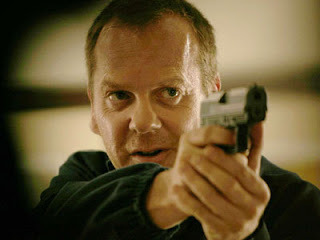
WHO ARE YOU WRITING FOR?! /Jack Bauer yell
Okay okay, put down the gun, Jack. I'm gonna try and figure this out. Let's first start with the kind of stories I write.
That's easy. I write horror stories! Except when they're not really horror, but kinda dark supernatural ghosty or science fiction. Or both. Except when they're not really about ghosts or science fiction, but just plain weird or funny. Or when I write fantasy. Or spiritual stuff. And then there's that one political thriller I tried to write and still might finish. And that women's fiction story I still want to do. And the dieselpunk-noir. Can't forget that. Or the steampunk collaboration! Or the vampire satire book. Golly, this hasn't accomplished much.
It might be easier to narrow down what I don't write. I do not, as a general rule, write:
1. Romance
2. Erotica
3. Religious stuff
And I'm pretty sure I will never write (at least from a purist standpoint, because I'm not quite nerdy enough):
1. Military stuff
2. Hard sci-fi
3. Pure historical fiction (the kind without a speculative or weird element)
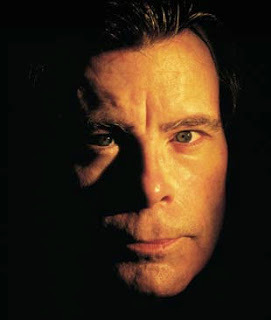
That was much easier. So going back to the paragraph on what I do write, it's very hard to find a core audience for all of those genres. There are some people who do like all those things. They're usually the kind of readers who will read based on author loyalty rather than specific genres. Ultimately, I think that's why writers like Stephen King and Neil Gaiman are so popular. They aren't all that restricted by genre. They write what they want to write, whether it's scary supernatural or by-the-book mainstream, and people will read it because they trust the author will spin them one hell of a yarn.
That's the kind of author I want to be. So when someone asks me who my audience is, the answer I most want to give is, "open-minded people who like to read interesting and possibly weird shit." And then hope like hell I've delivered on the interesting part, because if I haven't, I'm doomed to be a failure.
I realize this will do nothing to help prospective publishers or agents. They want to know where my book is going to sit on a shelf. They'll want to know how I might devise a marketing campaign for my book. It will depend on what I've written that they deem salable, I guess. I know I can come up with some possible marketing strategies for the individual books I write. But what I can't guarantee is that the readers will cross over when I stray from the kind of story that drew them in in the first place. If they like my version of horror, will they come and read my science-fiction? What about the fantasy or the women's fiction? I can't definitively answer this, because (see second paragraph), I'm not a marketer, and I'm not sure any strategy I have in mind would work any better than just writing the best thing I can write. It's not my job to know whether they will follow or how. I just have to create the best conditions under which they can do so. I can try to make my own way with it, but it will likely wind up being a sloppy, mostly failure-filled effort as I make my way along this craggy cave with no flashlight.
I certainly hope they'll follow, and I'll do my best to try to entice them. But all I know is that they won't do it if everything I write isn't at least good. If tasked with trying to figure out who my core audience is right now, or the people who would follow me and my work no matter what genre I write, I'd surely fail. Based on reviews I receive and the readership I have among my friends and family, most of my fans so far are women. Nerdy women who are not terribly unlike me. But I also have my share of male fans, at least that I know of. They're also pretty geeky/nerdy.
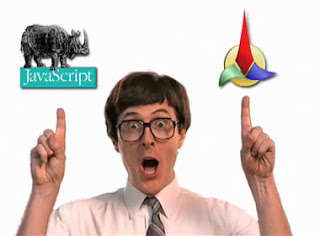
So I'm pretty sure I'm writing for nerds and geeks. But that's not enough. There are a lot of people on the nerd/geek spectrum. The ones who insist on utterly perfect science and correct minute facts are going to hate my guts. I'd love get a demographic breakdown of the 15000 people who have downloaded UNDER THE SCOTCH BROOM the 3000 or so who have downloaded ARIA so far, but I'm not sure it would reveal more than "people who like free books."
So I write for broke nerds/geeks. That's probably the least desirable audience right there, because if they can't find your stuff for free, they're probably smart enough to pirate it from elsewhere.
Great. I've really effed myself now.
But in all seriousness, good things are happening in Allie's indie world. For the first time since I've started doing this, I'm getting some actual exposure with my writing. And it seems a small handful of them have come back to buy something that costs money. And the reviews I've managed to scare up so far have largely been positive. I'm grateful for the bump in paid sales, and I'm utterly stoked that thousands of people are giving me reason every day to refresh my Amazon sales page once every five minutes or so. It means maybe I'm making some fans out there. That people are interested in my stuff. That they might follow me wherever I go, or at least recognize my name in their heads if they ever pass it in a bookstore. We'll see. Maybe if any of those fans are reading right now, they can tell me their age, gender, race, socioeconomic status, preferred political party, and whether they like Coke or Pepsi., and then I can put together a real demographic chart. The kind that gives marketing people wet dreams.
Until then, I guess I'll just keep writing what I want and see who sticks around for more helpings. All right, Mr. Bauer, you may fire when ready.
As a writer, I already hate this question. I'm a writer, I'm not a marketer. There is a small exception to the rule on this, but people who write books for a living are usually not born business people. But as a fiction writer? I hate that question so hard I want to punch it with brass knuckles.
But that's not good enough, because in today's publishing world, we writers can't just sit back and be creative and collect money. We have to be the business people we weren't born to be. We have to strategize, or whatever. And in order to effect a good book selling strategy, we have to know (among other things) who our audience is.

WHO ARE YOU WRITING FOR?! /Jack Bauer yell
Okay okay, put down the gun, Jack. I'm gonna try and figure this out. Let's first start with the kind of stories I write.
That's easy. I write horror stories! Except when they're not really horror, but kinda dark supernatural ghosty or science fiction. Or both. Except when they're not really about ghosts or science fiction, but just plain weird or funny. Or when I write fantasy. Or spiritual stuff. And then there's that one political thriller I tried to write and still might finish. And that women's fiction story I still want to do. And the dieselpunk-noir. Can't forget that. Or the steampunk collaboration! Or the vampire satire book. Golly, this hasn't accomplished much.
It might be easier to narrow down what I don't write. I do not, as a general rule, write:
1. Romance
2. Erotica
3. Religious stuff
And I'm pretty sure I will never write (at least from a purist standpoint, because I'm not quite nerdy enough):
1. Military stuff
2. Hard sci-fi
3. Pure historical fiction (the kind without a speculative or weird element)

That was much easier. So going back to the paragraph on what I do write, it's very hard to find a core audience for all of those genres. There are some people who do like all those things. They're usually the kind of readers who will read based on author loyalty rather than specific genres. Ultimately, I think that's why writers like Stephen King and Neil Gaiman are so popular. They aren't all that restricted by genre. They write what they want to write, whether it's scary supernatural or by-the-book mainstream, and people will read it because they trust the author will spin them one hell of a yarn.
That's the kind of author I want to be. So when someone asks me who my audience is, the answer I most want to give is, "open-minded people who like to read interesting and possibly weird shit." And then hope like hell I've delivered on the interesting part, because if I haven't, I'm doomed to be a failure.
I realize this will do nothing to help prospective publishers or agents. They want to know where my book is going to sit on a shelf. They'll want to know how I might devise a marketing campaign for my book. It will depend on what I've written that they deem salable, I guess. I know I can come up with some possible marketing strategies for the individual books I write. But what I can't guarantee is that the readers will cross over when I stray from the kind of story that drew them in in the first place. If they like my version of horror, will they come and read my science-fiction? What about the fantasy or the women's fiction? I can't definitively answer this, because (see second paragraph), I'm not a marketer, and I'm not sure any strategy I have in mind would work any better than just writing the best thing I can write. It's not my job to know whether they will follow or how. I just have to create the best conditions under which they can do so. I can try to make my own way with it, but it will likely wind up being a sloppy, mostly failure-filled effort as I make my way along this craggy cave with no flashlight.
I certainly hope they'll follow, and I'll do my best to try to entice them. But all I know is that they won't do it if everything I write isn't at least good. If tasked with trying to figure out who my core audience is right now, or the people who would follow me and my work no matter what genre I write, I'd surely fail. Based on reviews I receive and the readership I have among my friends and family, most of my fans so far are women. Nerdy women who are not terribly unlike me. But I also have my share of male fans, at least that I know of. They're also pretty geeky/nerdy.

So I'm pretty sure I'm writing for nerds and geeks. But that's not enough. There are a lot of people on the nerd/geek spectrum. The ones who insist on utterly perfect science and correct minute facts are going to hate my guts. I'd love get a demographic breakdown of the 15000 people who have downloaded UNDER THE SCOTCH BROOM the 3000 or so who have downloaded ARIA so far, but I'm not sure it would reveal more than "people who like free books."
So I write for broke nerds/geeks. That's probably the least desirable audience right there, because if they can't find your stuff for free, they're probably smart enough to pirate it from elsewhere.
Great. I've really effed myself now.
But in all seriousness, good things are happening in Allie's indie world. For the first time since I've started doing this, I'm getting some actual exposure with my writing. And it seems a small handful of them have come back to buy something that costs money. And the reviews I've managed to scare up so far have largely been positive. I'm grateful for the bump in paid sales, and I'm utterly stoked that thousands of people are giving me reason every day to refresh my Amazon sales page once every five minutes or so. It means maybe I'm making some fans out there. That people are interested in my stuff. That they might follow me wherever I go, or at least recognize my name in their heads if they ever pass it in a bookstore. We'll see. Maybe if any of those fans are reading right now, they can tell me their age, gender, race, socioeconomic status, preferred political party, and whether they like Coke or Pepsi., and then I can put together a real demographic chart. The kind that gives marketing people wet dreams.
Until then, I guess I'll just keep writing what I want and see who sticks around for more helpings. All right, Mr. Bauer, you may fire when ready.
Published on October 06, 2011 20:57
September 23, 2011
Allison M. Dickson: Amazon Top Seller? For Real?
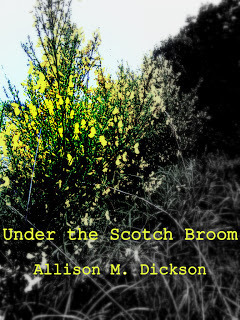
As of this writing, my short story Under the Scotch Broom has just topped 4000 downloads on Amazon since yesterday. It's also currently the #1 download in the Top 100 Science Fiction and just dropped to #2 in the Top 100 Free short stories (it had been #1). It's currently #49 overall in the Free category.
You might be asking how this happened, and you wouldn't be alone. I check my figures at Amazon every morning. Usually, the results aren't surprising. Sales are steady enough but painfully slow, and I admit freely that it's because I haven't put a whole lot into marketing myself. I'm terrible at it. But as I've always said, my sales are usually in proportion to the amount of effort I put into selling my own work.
Yesterday, however, something changed. When I logged into Kindle Direct, I noticed an increase in sales across all my titles. But none more so than for Under the Scotch Broom. For the first time ever, I was staring at a 4-digit number in the sales column. At that time, it was something like 2847. The number has been increasing steadily by the minute. In the 18 hours since I've made this discovery, people have downloaded over 1200 more copies, and the number is climbing by the minute.
But at first, I refused to believe it. I stared at that number for a few minutes, not reacting. I glanced back and forth between the number and the sales column. Number, sales column. Sales column, number. Clearly this was a mistake. Why this story? Why that many downloads? It just didn't make any sense.
Then I went to the product page and understood at least a little more. Amazon had marked my $.99 download to Free.
Now before you get all pissed off on my behalf, let me explain a few things.
1. Under the Scotch Broom has been a free title on Smashwords since July. I did that on purpose. I firmly believe in offering a free title as a means of self-promotion. And it's worked somewhat successfully. People have read the story and have positively reviewed it.
2. I wanted to offer the story free on Kindle as well, but Amazon does not as of yet allow authors to price their wares below $.99. The only caveat is that Amazon, per their Terms of Service, reserves the right to price your story to match the competition. So if it sees, for instance, that you have a story offered cheaper elsewhere online, it will adjust its prices to match or beat that price. At any rate, Amazon finally got the memo on Under the Scotch Broom, because it's now free. And that's when the downloads started happening.
Of course, this only explains why Under the Scotch Broom is free. What it doesn't explain is why so many people are downloading it at the rate they are (4030 as of the last refresh). There are hundreds if not thousands of free ebooks available on Amazon. Amazon is the largest bookseller in the world. I considered it a huge feat when I cracked the Top 25 on Smashwords during the Summer Sale, when my sales were a tenth of what I'm seeing here. My brain almost refuses to believe it.
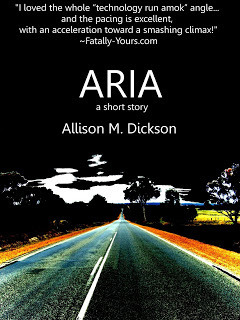
There are a lot of possible avenues this could take me. My work on Amazon in general will be more visible. But I still want to know why! Why this story? Why now? Under the Scotch Broom was the first ebook I ever put up for sale. The cover isn't up to my current standards, and I'm sure the formatting isn't great either. It was originally intended to be an experiment in how to use Kindle Direct Publishing. I never really expected people would download the thing en masse, whether it was free or a buck. Aria is another free Smashwords title that Amazon could mark down any day now, so I'll be watching that one closely.
I'm expecting at any moment for the ride to stop, and that all of this will be revealed as an extended dream sequence fueled by painkillers following my gallbladder surgery earlier this week. And even if this is for real, is it possible that people will want to come and buy my other work if Under the Scotch Broom does it for them? I can only hope so, but I've learned to remain extremely cautious in my optimism. Maybe what will really happen is that everyone will see me for the hack I am and they'll all be avoiding my work from now on.
I can't escape the certainty that I'm not worthy. Just when I thought I was over my Impostor Syndrome, it rears its ugly head once again. I'm more afraid of success than I am of failure. Last night, I dreamed that everyone wrote horrible reviews about my work. There is a price that comes with increased visibility. It's the one where people will finally see you for the crackpot you truly are, or where after you've climbed high enough, people will start rooting for you to fall. For now at least, I can't hide behind the ocean of other hopefuls.
But enough of my paranoia. I'll just focus on the positive and let the rest play out on its own. For now, I'll keep repeating to myself that one MY stories made it as a Top Download on mother-freakin AMAZON (4059 downloads now)!
I know, right?
Published on September 23, 2011 08:06
September 14, 2011
Stamping Out A Daughter's Shame
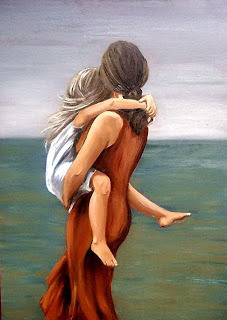
No one should have stand on a scale and cry at the number it reads. Especially if that person is ten-years-old. And as much as I wish I could say I've shielded my daughter from my own lifetime of shame and hate for my body, I can't. That would be a lie. She's seen me diet to lose weight countless times. She's seen me drink special shakes and eat salads while everyone else was eating a normal dinner. She's overheard conversations between her father and me about weight loss. She's seen me cheer at lost pounds. She's seen me struggle to maintain my composure in dressing rooms. Hell, I think I even took her to a few Weight Watchers meetings and weigh-ins when I was still giving my money to those worthless assholes.
And that's not even including all the times she's seen the pretty, thin girls become the heroines in TV or movies, or fat people being ridiculed and used as examples of what not to do or how not to live. I'm sure her friends and other people at school have made fun of a few fat kids. I know that even if I hadn't been such a poor example of body acceptance her entire life, she might still have found reason to cry when she stepped on that scale and saw the number "103" glaring at her like a reprimand.
So I sat her down last night and I told her that the path I took at her age, the one where I noticed for the first time (with help from others) that I was "fat," was blocked. That she would not go the way I did. She wouldn't be the one searching desperately for a solution, no matter how destructive, to a problem that doesn't exist. A non-existent problem that only becomes a problem when we try to solve it. I told her that I would not allow her to be driven by shame and loathing, from herself or others.
I know that I have done this to her, and it is perhaps my greatest failure as a parent. But I didn't realize then the damage I was doing. That hating myself in front of her was teaching her to hate herself.
It's not too late to fix it, though. Of this, I am sure. My intelligent, generous, loving, artistic, funny, compassionate, animal-loving daughter will know how very precious she is. I will teach her the habits I should have had at her age. That to live, love, sing, dance, run, swimg, laugh, cry, and eat is all part of being a human, and that her long legs, her wide hips, the pooch of her belly -- however they may grow or change shape as she ages or bears children someday -- are a lovely vehicle in which to do all of those things, and she should cherish it and nurture it and love it. Not starve it or cut it or deny it or hate it.
I will love myself as much as I can, if only to be the example I have failed to be her entire life. Maybe we'll sit down and read these ten beautiful rules together so she can better understand the many nuances of this very important issue. I hope I'm not too late.
Published on September 14, 2011 14:28
September 12, 2011
New Writing Gig and Other Updates
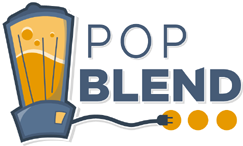
The New Gig
A couple weeks ago, a friend of mine encouraged me to apply for one of the open writing positions at entertainment blogging site, Cinema Blend. Figuring I had nothing to lose, I sent the editor some writing samples, crossed my fingers, and then promptly forgot about it.
A week later, I received a positive response. They liked what they saw, and the next day I was writing my first story for their pop culture section, Pop Blend. It's been an interesting experience so far, and in many ways unsettling. In much the same way it's unsettling to have someone publish one of your fiction stories, but perhaps worse because the audience is much larger, and the stories have to keep coming at a rate of five or six per week. And people on the internet can be, for lack of a better word, jerkfaces if they don't like or agree with something. Thankfully I haven't had to deal with anyone like that yet. But Cinema Blend articles appear regularly in Google News and other aggregates, so eyes are landing on what I write in a way they never have before. And if I get something wrong, it's not only my reputation on the line, but the credibility of the people I'm writing for. So while it feels like blog writing in tone, I'm no longer playing in my own playground, and I feel a little intimidated and unsure of myself at the moment. As such, my writing personality has felt a little more formal and buttoned up than it's used to. Eventually, as I get more comfortable in those shoes, I'm sure a little more of my typical irreverence will come through.
So although I wouldn't disparage the term "journalist" or "reporter" by comparing myself to one, I can kinda understand that pressure a little more. You want to get things right. You HAVE to. At any rate, I consider it good practice, and I hope it gets my name out there a little more and opens up to bigger opportunities down the road.
Other Updates

Fall is fast approaching. My favorite time of year, no doubt. I've already made some great pickle relish from a bounty of cucumbers, and I'm soon going to be starting on my yearly apple and pear butter extravaganza. Bread baking and other goodies will soon commence, as the cooler temperatures drive me into my yearly domestic goddess paradise mode. The family and I have also been embarking on a largely meat-free endeavor with our diets, and I've done some experimenting in the kitchen to fantastic results. So expect some foodie posts here in the near future.
Apart from that, I'm also working hard to wrap up the first draft of my dieselpunk-noir COLT COLTRANE AND THE LOTUS KILLER by the end of the month so I can start concentrating on the next book, which will be written during National Novel Writing Month in November. Originally, I was going to be writing a sequel to SCARLET LETTERS: THE TALE OF THE VAMPIRE MAILMAN. It seemed to be a fun and lighthearted way to spend the month. But then something else started tugging at me again, and I decided I couldn't ignore it this time. I now know it's time to return to a world I'd always believed in but long left abandoned during a time when I didn't feel like I could do the story proper justice. And that story is THE LAST SUPPER, a dystopian science fiction that envisions a future riddled by grain blight and overbearing theocracy.
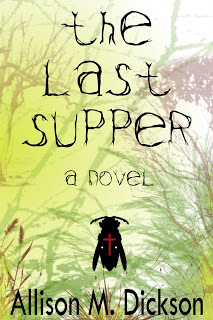
This will be my third attempt to tell this story. The first version was a novella, and it was based on a gimmick that I now realize is too neat to be at all compelling or believable. My second attempt at the story was an expansion into a novel (my first attempt at a novel, period), which made it to about 80,000 words before I realized I had no clue where I was going with it. That story still has some very compelling elements and characters I'd like to borrow for this version, but the rest is being scrapped and the whole story is being redrafted into a different monster.
The overall tone of this book is going to be far different. It's not going to be the sweeping grand epic I was originally going for. I'm paring it way, way down and focusing explicitly on the characters, leaving the world as a backdrop so chilling that backstory of the cataclysm won't really be necessary. In that way, it's going to have more of a feel that's comparable to The Road (although I will likely be using punctuation, and I'm not nearly as good a writer as Cormac McCarthy). It'll be quieter, more thoughtful, less action-driven than most of my other stuff. But it will say everything I wanted to say originally. I won't be pulling any punches this time. I can clearly hear the voice of this story in my head, and I'm very excited about it.
Although I do plan to return to the SCARLET LETTERS universe eventually, I want to do it during a time when I have little else to work on. The sequel would be going directly to Smashwords/Amazon, and although I'm okay with that (the first book has been very successful thus far), I still have several projects that I intend to try on the traditional market, and I'd like to finish those first.
Published on September 12, 2011 10:13
August 31, 2011
On Eating "Gourmet"
 I love food. From the time my mom let me into the kitchen to make my own grilled cheese sandwiches as a kid, I've been obsessed with all things culinary. I've become a self-taught student of the vocabulary, the gadgets, the technique. Before the Food Network and the age of the celebrity chef, there was the crazy Cajun guy, the Frugal Gourmet, and of course Julia Child. But my favorite was the show Great Chefs, which took the cameras right into the kitchens of some of the world's greatest restaurants, and the chefs there would prepare the most amazing or frightening but almost always beautiful concoctions I'd ever seen. I was most obsessed with the pastry chefs, not only because I have a major affinity for eating baked goods, but because I love the process that goes into making breads and desserts. Part of me, a very large and thriving part of me, still wants to be a chef. Still believes that this is very much an unanswered calling.
I love food. From the time my mom let me into the kitchen to make my own grilled cheese sandwiches as a kid, I've been obsessed with all things culinary. I've become a self-taught student of the vocabulary, the gadgets, the technique. Before the Food Network and the age of the celebrity chef, there was the crazy Cajun guy, the Frugal Gourmet, and of course Julia Child. But my favorite was the show Great Chefs, which took the cameras right into the kitchens of some of the world's greatest restaurants, and the chefs there would prepare the most amazing or frightening but almost always beautiful concoctions I'd ever seen. I was most obsessed with the pastry chefs, not only because I have a major affinity for eating baked goods, but because I love the process that goes into making breads and desserts. Part of me, a very large and thriving part of me, still wants to be a chef. Still believes that this is very much an unanswered calling.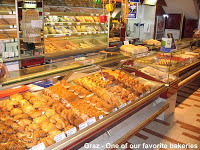 I still have a dream one day of owning a bakery, with a bookstore attached to it. I can so clearly see this dream in my head that I have no doubt that someday, it will be a reality. It will be in a quaint little town. There will be a bell on the door that jingles every time a customer comes in. I will hold book release and signing events for local authors. And they will stay for my fabulous artisan breads and cookies, bars and cakes. There will be Belgian waffles every Sunday morning. I'll have a spate of regulars whom I will all know by name. People will come from all around to try the food and browse my eclectic literary collection while sipping their coffee. All the fillings and fruits in my pastries will be homemade from locally grown, seasonal ingredients. I'll even buy locally milled flour, and maybe even offer some confections for the gluten-free crowd. Everything will have that rustic, handmade look. My coffee will be incredible and freshly ground from fair trade beans. Someday, my kids will one day inherit this business and make it their own. The business, and the philosophies on which it was built, will be our legacy to them and future generations.
I still have a dream one day of owning a bakery, with a bookstore attached to it. I can so clearly see this dream in my head that I have no doubt that someday, it will be a reality. It will be in a quaint little town. There will be a bell on the door that jingles every time a customer comes in. I will hold book release and signing events for local authors. And they will stay for my fabulous artisan breads and cookies, bars and cakes. There will be Belgian waffles every Sunday morning. I'll have a spate of regulars whom I will all know by name. People will come from all around to try the food and browse my eclectic literary collection while sipping their coffee. All the fillings and fruits in my pastries will be homemade from locally grown, seasonal ingredients. I'll even buy locally milled flour, and maybe even offer some confections for the gluten-free crowd. Everything will have that rustic, handmade look. My coffee will be incredible and freshly ground from fair trade beans. Someday, my kids will one day inherit this business and make it their own. The business, and the philosophies on which it was built, will be our legacy to them and future generations. I used to think eating gourmet would mean having to bypass a lot of ingredients I typically don't like. Olives, stinky cheeses, weird meats and fishes, unfamiliar fruits and vegetables. I also used to think it would mean that I would go hungry. That if I spent extra money on great food, it would be in tiny portions and I'd be craving a cheeseburger two hours later. I have since discovered that none of these things are true. That when a food is prepared properly, there is almost nothing I won't at least try, if not love. At a wonderful little French bistro a couple weeks ago, my husband and I sampled a wide variety of foods, most of it locally grown and prepared with the utmost care. The pissaladière (or French-style pizza) we ate for our first course had goat cheese and nicoise olives on it. I traditionally dislike both of these foods. The pizza was nonetheless delicious, and I didn't pick a single thing off it.
I used to think eating gourmet would mean having to bypass a lot of ingredients I typically don't like. Olives, stinky cheeses, weird meats and fishes, unfamiliar fruits and vegetables. I also used to think it would mean that I would go hungry. That if I spent extra money on great food, it would be in tiny portions and I'd be craving a cheeseburger two hours later. I have since discovered that none of these things are true. That when a food is prepared properly, there is almost nothing I won't at least try, if not love. At a wonderful little French bistro a couple weeks ago, my husband and I sampled a wide variety of foods, most of it locally grown and prepared with the utmost care. The pissaladière (or French-style pizza) we ate for our first course had goat cheese and nicoise olives on it. I traditionally dislike both of these foods. The pizza was nonetheless delicious, and I didn't pick a single thing off it. The portions were on the smaller side, but neither of us left hungry. In fact, we were nearly too full for dessert, but we ate it anyway -- a tiny flourless hazelnut cake that was so rich, three or four bites was more than enough. And three hours later, we weren't hungry for more food. We'd been perfectly sated. Not too much, not too little. All great ingredients, carefully prepared and delicious. My body and appetite were equally at peace with one another, which is something that is too rare.
How often does this happen for anybody anymore? How much better off would we be if we all ate in such a way? Enjoying rich and delicious high-quality ingredients, not thinking of diets or calories or fat grams, but quality through and through? I have found that when I'm consistently giving myself the very best, I simply don't need as much. When the food is perfectly nourishing and appealing, a little bit of it goes a long way.
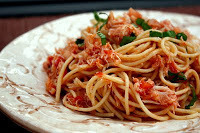 This is why the French are so healthy while eating their butter and froie gras. This is why you can go to Italy and nosh on pasta for days, and probably not gain a pound. Why in Japan, you can eat little pieces of sushi, with generous portions of white rice, and drink delicious teas and soups, and not feel like you're nine months pregnant with a gigantic food baby.
This is why the French are so healthy while eating their butter and froie gras. This is why you can go to Italy and nosh on pasta for days, and probably not gain a pound. Why in Japan, you can eat little pieces of sushi, with generous portions of white rice, and drink delicious teas and soups, and not feel like you're nine months pregnant with a gigantic food baby. We have it backwards here. We're eating cheap and nutrient-hollow food, in enormous enough quantities so that we don't notice how very malnourished we are. Modern convenience cuisine was thought up in a corporate boardroom by guys who have no care in the world where a food comes from or whether it tastes great, so long as people can get a whole bunch of it for a few bucks.
 This is why I want to take more culinary risks in my own kitchen now. And why I won't shudder at the prices of better food if I know I won't need as much of it to feel happy. It's nourishing in its own way to know my money is going to sustain the local farmer who is growing beautiful food for the love of it, and that the money I give him is going right back into his crops, crops that probably feed his family too.
This is why I want to take more culinary risks in my own kitchen now. And why I won't shudder at the prices of better food if I know I won't need as much of it to feel happy. It's nourishing in its own way to know my money is going to sustain the local farmer who is growing beautiful food for the love of it, and that the money I give him is going right back into his crops, crops that probably feed his family too.It's the kind of eating that feeds more than hungry stomachs. It sates the conscience and the need to be creative. It opens us up to new experiences and cultures. It makes us more delicate and mindful even about the way we cut the food and put it in our mouths, how we taste it and use our tongues to find and appreciate every ingredient, the way we use our eyes to study the brushstrokes in a beautiful painting.
When the food is truly good, it fuels our souls and our dreams.
Published on August 31, 2011 11:12
August 24, 2011
The Things We Leave Behind
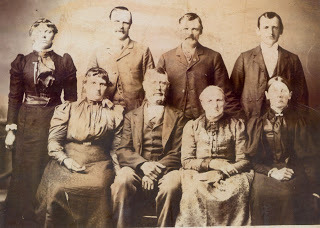 It's interesting the things that people hang on to throughout their lives. Today, as I watched my mother sort through the belongings of a recently deceased 94-year-old woman (it's a long story I won't go into here), I got a true sense of the memories a person can accumulate throughout a very long life.
It's interesting the things that people hang on to throughout their lives. Today, as I watched my mother sort through the belongings of a recently deceased 94-year-old woman (it's a long story I won't go into here), I got a true sense of the memories a person can accumulate throughout a very long life. No, this woman wasn't a hoarder. She was very sentimental, and understandably so. The deaths of her children and her husband long preceded her own, and her home was a memorial to the life she'd led before, during, and after tragedy came to define it.
She'd saved every scrap of their lives: photographs, report cards, plaques, artwork, records, toys. Every piece of furniture in her house had been in the same place for forty or more years. Most of it is now sitting on a truck headed to Georgia in a short time, likely to be distributed to surviving family members down that way, or maybe even sold off in some cases. It was all very well kept, but old. The house itself was in desperate need of updating. I don't imagine it will fetch much on the market with all the work it needs, but it's hard to imagine another family inhabiting that place. Of course, it will happen. Just as I'm now living on top of someone else's memories, and strangers will one day be living on top of mine.
Because of my mother's relation to this woman, she got to take a number of these things with her, and I imagine when she's gone, many of those things will be passed on to the rest of us. A chair, a photo album, a vintage Pepsi wastebasket. These precious objects will never really die within the protective circle of the family, and the memories they hold will be passed down to the younger generations.
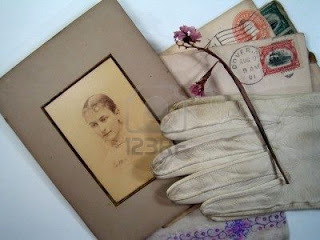 It got me to thinking about what I would leave behind when I die. I don't keep photographs in albums. I keep them on physical and virtual hard drives. I haven't saved every report card, every scrap of paper my kids have brought home. I've never been much for scrapbooking. I'm content to keep most of my memories in my head. The closest I come to recording the events of my life is through blog or status updates. Or when I interpret my feelings and observations through fiction. There aren't that many scraps of paper to represent me, really. When I die, there will be some furniture, books, kitchen stuff. A few of my favorite knickknacks. Oh, but who am I kidding? The furniture I'm sitting on now likely won't last another five years. These days, there are few people who could afford a couch that would last forty years perfectly intact, much like the one I saw today. We are living in the Ikea Age. Nothing is built to last anymore.
It got me to thinking about what I would leave behind when I die. I don't keep photographs in albums. I keep them on physical and virtual hard drives. I haven't saved every report card, every scrap of paper my kids have brought home. I've never been much for scrapbooking. I'm content to keep most of my memories in my head. The closest I come to recording the events of my life is through blog or status updates. Or when I interpret my feelings and observations through fiction. There aren't that many scraps of paper to represent me, really. When I die, there will be some furniture, books, kitchen stuff. A few of my favorite knickknacks. Oh, but who am I kidding? The furniture I'm sitting on now likely won't last another five years. These days, there are few people who could afford a couch that would last forty years perfectly intact, much like the one I saw today. We are living in the Ikea Age. Nothing is built to last anymore.I've kept a selection of the kids' artwork and things, but only enough to fit into a small box. I have almost no baby mementos. No first locks of hair or baby teeth. No favorite rattles or baby shoes. No well-loved stuffed animals. When it comes to saving things, I've never been particularly good at it. The clothes and things were donated to people who needed them more. We have pictures, but they're digital.
How would things be if I died not now, but several decades from now? What more will I have accumulated? Or will it be even more digitized than before? Will my kids and grandkids ever sit in my home for hours or days, sorting through my leavings, laughing, crying, remembering? Having that catharsis that I think is often necessary to be able to properly deal with the death of a loved one?
 And what about my kids, and their kids, and so on? Their physical footprint on this world will be even fainter than mine. They likely won't have many books at all, because they'll all be stored on an electronic device. Same with their pictures, music, and other vital documents. Newspapers will be things they look at in museums or old movies as relics of another age. School work will be relegated exclusively to tablets over the next decade.
And what about my kids, and their kids, and so on? Their physical footprint on this world will be even fainter than mine. They likely won't have many books at all, because they'll all be stored on an electronic device. Same with their pictures, music, and other vital documents. Newspapers will be things they look at in museums or old movies as relics of another age. School work will be relegated exclusively to tablets over the next decade. And although I rejoice in some of these technical marvels, I can't help but feel the sense of emptiness it creates when it comes to the end of someone's life, and the sum of all their feelings and memories and experiences can be stored on a few pieces of silicon, and the rest sent to a landfill, because it was too cheaply made to be salvageable. The stuff that's worth keeping, it might fit into a few small boxes. Unless you were lucky enough to inherit something from a dead grandparent or have an interest in antiquing or all things retro.
If you're an adult older than thirty reading this, you will likely be the last generation of people who will find it commonplace to sift through those old boxes full of books, photo albums, scrapbooks, those yellowed newspaper clippings, those relics of an age when people lived forever and had a whole lot of "stuff" to show for it.
It was sad to see much of Helen's life boxed up and carted away. Her stuff is now the property of many. But in a way, it seems like the most natural thing in the world. It's how families pay tribute, how they grieve and remember.
Not long from now, there will be a death in a family, and each survivor will get a specialized chip with their loved one's life etched onto it, reducing the whole process to something more binary. This seems a little hollow to me. Too fragile to sustain itself. As we age, I think we will have to work harder than ever to be indelible in our increasingly intangible world.
Published on August 24, 2011 15:56
August 19, 2011
The Thing in Writing that Can't Be Taught
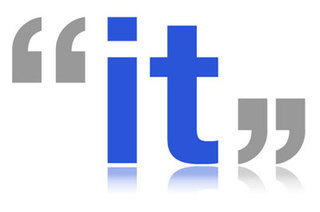 I used to harbor a certain illusion about writing. I used to think if you can read or speak, then certainly the ability to write isn't that far off. It's a rather romantic attitude to have, and I think it makes writing one of the most widely attempted art forms, the one that everybody thinks they can do or would do "if they didn't have such a busy life." Because apparently, writing a book or a story is "easy," and all it takes is a "really cool idea."
I used to harbor a certain illusion about writing. I used to think if you can read or speak, then certainly the ability to write isn't that far off. It's a rather romantic attitude to have, and I think it makes writing one of the most widely attempted art forms, the one that everybody thinks they can do or would do "if they didn't have such a busy life." Because apparently, writing a book or a story is "easy," and all it takes is a "really cool idea."I can't tell you how insulting that is (and I hear it a lot). It's on par with someone who might say, "Oh, I'm sure I could compose a piano concerto, but I have better things to do than sit on a bench all day plunking keys. But hey, kudos to you!" Of course, no one would say that, because everyone knows that playing the piano is hard, and playing it to the level that one could compose something coherent and beautiful is only within the grasp of the truly talented pianists out there. I certainly know I couldn't do it, and I've dabbled in music.
I didn't realize that the same was true of aspiring writers until I started freelance editing. In the time I've been doing this, I've read dozens, perhaps by now even hundreds, of manuscripts. And now, I can honestly say that the number of people who have submitted work to me that is even remotely publishable, original, daring, or potentially awesome, can only be counted on one hand. This isn't about typos. This isn't about bad metaphors or even grammar. Those things are usually the product of poor teaching or just plain rusty mechanics that most adults have when they decide to take up the art many decades after their last English class. I'm not excluded at all from that group myself.
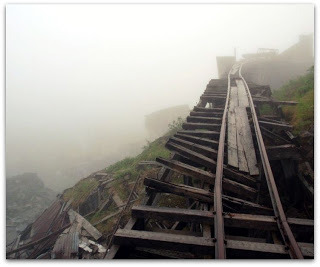
This track? Not so good...
No, there is something more that makes a piece of writing connect with a reader. It's almost intangible. It's that thing where you are following along without even trying. Where you don't have to question the logic or authority of the storyteller, because they're guiding you efficiently along a well-laid track, which allows you to experience all the events of the story without having to go, "Wait... I thought we were just here... and now we're here? What?" It's where you don't feel like you've just been taken on a tour of a strange city by a guide who is drunk and/or schizophrenic.
And I firmly believe that this is the one thing that separates even the "okay" writers from the rest of the pack. Even the supposed worst writers on the shelves right now, the ones I harangue mercilessly, the Pattersons and the Meyers and the Dan Browns. Even they, on their worst day with their laziest metaphors and driest prose, can do that "thing" I'm trying desperately to describe. They can guide you the reader from Point A all the way to Point Z without once making you feel like the stable and known universe has taken a nosedive. You know from the minute you open the cover of one of their books that you're going to get a full and complete story that makes sense, at least on a fundamental level. It might not be the prettiest or most creative story, and you might find you even hate the characters or think they're poorly developed or have terrible dialogue, but you can STILL identify it as a complete and coherent work. You are able to properly evaluate the story for all its good and bad attributes because the storyteller ultimately delivered.
Many of you probably still don't know what I'm talking about. You'll undoubtedly tell me how many books you threw aside in disgust when you lost interest or whatever. And I get that. There are some pretty crappy books and stories out there, endorsed by some of the biggest publishers in the world. But unless you're someone who reads rough writing for a living, who gets to glimpse the hopeful efforts of someone who just decided one day they wanted to write a novel because it would "be easy," you probably won't get it. But agents, editors, and freelancers like me? They get it. And in my own way, I understand why they're so jaded.
I think they get that when it comes to writing, no matter how pretty you make your prose, no matter how eloquent some of your metaphors, no matter how precise your punctuation and grammar, if you don't have that intangible "thing" that allows you to draw someone in and follow along and give a damn (even the littlest bit), you're not doing the work of a writer. I thought The Walking by Bentley Little was one of the worst books I've ever read in my life. And yet... I finished it. That has to say something. I knew what his main character was, what he was motivated by, and the story followed a logical path to a logical conclusion (even if that conclusion was lame). I've since read manuscripts that made The Walking look like James Joyce.
And that's about 99% of the manuscripts I receive.
I wish I could teach this. I wish I could open people's heads and dump this ability in there. It would sure make our jobs easier. But I don't think this is something that can be taught. I think this is purely innate. You can teach someone to better develop aspects of their art, but I think that generally ends at prose-related stuff. I think the logic that drives an overall story, that magic that compels someone to turn the page, is really the talent that every true writer possesses, and few people have it.
So what's the point in telling you all this? Two things:
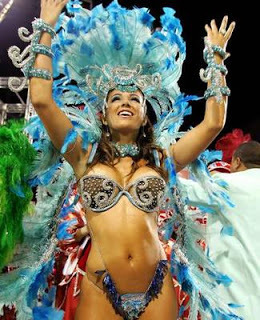
Only in my dreams...
1. Writers: Don't take your art for granted. If you've got that gift, treasure it and use it with pride. If you're confident you can draw a reader along the track, but just need help further fleshing out the world around that track, don't despair. You can improve that with practice. Be assured you already have the most important part down.
2. Everybody: Don't think that "anybody" can be a writer. It's insulting to writers. It's no different than any other job. Not everybody can be a doctor. Not everybody can be an engineer. Not everybody can dance a good and sexy samba. Spend a few hours reading manuscripts people have to read for a living, and you'll soon realize how very rare it is to find even a competent writer.
And to those who do it and aren't sure if they have that "thing,' don't think I'm trying to shatter your hopes here. I suppose if there is any message I have for all the dreamers out there, it's this. Don't for once ever think that what you're doing is easy. If it feels that way, you're probably doing something wrong. As Stephen King said it once, don't come lightly to the page.
Throwing words onto a page is easy. But writing, the real kind, is hard. It's damn hard.
Published on August 19, 2011 07:33
August 17, 2011
Review: The Help
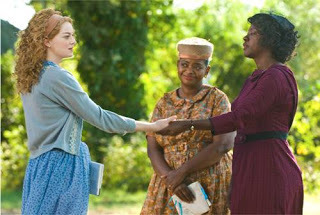 Some people are calling The Help a lighthearted, feel-good movie. More virulent viewers are calling it a cesspool of white guilt, stereotypes, and liberal pandering.
Some people are calling The Help a lighthearted, feel-good movie. More virulent viewers are calling it a cesspool of white guilt, stereotypes, and liberal pandering.I'm not sure we were watching the same movie. In my version of the film, I saw a touching and moving story about the culture of racism in the early 60s in Jackson, Mississippi, and the institution of middle-class "society" families using African American maids to raise their children and clean their homes, but won't allow them the dignity of using the indoor bathroom. It's a story told with humor, intelligence, and grace. It's as uplifting as it is infuriating, because while we're seeing a very ugly and shameful part of American culture, it has a sense of hope and optimism about it that not all humans are assholes, and that some people will prevail in a system that was built to beat them down. Sometimes we need to know that.
If you want a cold and unflinching look at black poverty and oppression, watch Precious and then try not to slit your wrists afterward.
There are many plots and subplots throughout the film, but the basic story is as follows: Skeeter (Emma Stone, who seems to be everywhere these days, and I'm perfectly fine with that), a peppy and non-conformist who refuses to settle down with a man and become a domestic goddess like her mother and friends, returns home after graduating from Ole Miss to get a job as a journalist. Of course, the only column offered to her is that of Miss Myrna, who I guess is the Dear Abby of house cleaning. To gain some perspective on domestic duties, she asks her high society friends if she can talk to their maids. She would have talked to her own, but she was disturbed to learn that her mother fired her while Skeeter was gone at school. This sad note later becomes a thematic turning point in the latter part of the film.
One of Skeeter's friends reluctantly agrees to let Skeeter talk to her maid (so long as it doesn't interfere with the maid's work), and this is where Skeeter meets Abilene, the main maid of the story played by Viola Davis in a heartbreaking Oscar-caliber performance. Skeeter, perhaps because she managed to get a college education and escape the prejudiced systems of life in Jackson, is troubled by the undignified ways her friends treat "the help," particularly by Hilly, the racist high-falutin socialite queen of Jackson played so effectively by Bryce Dallas Howard that I'd happily hit her in the face with a pie if I saw her on the street. She decides she wants to interview as many maids as she can for a book that shows their perspectives as women who are forced to raise white children while their own kids live in poverty.
What they're doing is risky and even technically illegal, and it's happening during the most volatile time of the Civil Rights Movement. A feeling of danger permeates through what they're doing, and although the film doesn't capitalize on this too heavily, I found myself to be kind of relieved about that. Like I said, such things belong in a different kind of movie. I loved these characters. I cared deeply for them. The last thing I wanted to see was something terrible happening to them because of some Drama Law that requires a character must die in a horrible way before we can finally give a damn. Death is not the only way to achieve a catharsis.
The script does suffer a tad from being overstuffed. There were some half-baked plot elements that should have been cut altogether, and which probably resulted from trying to remain too faithful to the book. However, that complaint is minor. The movie shines so much through its performances that a few dull spots here and there hardly matter.
Movies like this have a tendency to make me want to be a better person. They ignite in me the fury I have against social injustice. The racism exhibited in this film isn't quite as loud and in our faces today, but it's still very much there, spoken in whispers and in code words. The Hillys of the world haven't gone anywhere. They've just learned to sing their tunes a little differently. White guilt, you say? Hell, I'd say we have a lot to be guilty about.
Grade: A
Published on August 17, 2011 07:16
August 16, 2011
Confessions of a Terrible Fighter
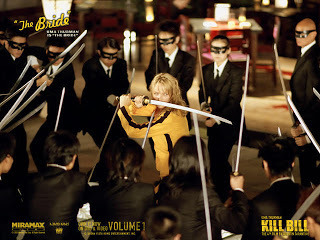
Maybe I'd do better if I had a Hatori Hanzo blade...
I give up on myself way too easily. When I read stories of bloody-knuckled persistence in the face of all rejection and adversity, I manage to feel like a woefully inadequate human being, because I when it comes to trying. I mean REALLY REALLY trying, I suck. When a hard enough punch is thrown, I remain on the mat, even when I know I have enough in me to get back up and keep fighting. I think it's because by that point, I just don't want to get knocked back down again. It hurts too much, and I figure that since so many people have already dealt me defeating blows, what's to say the rest of the people won't either?
Then I read stories like the one about Kathryn Stockett, author of bestselling novel The Help, and how she'd submitted her manuscript 60 times and had it rejected each and every time (some of those rejections, in fact, were pretty damn mean), until the 61st. After that, her life changed dramatically. It's times like this when I realize how much of a wimp I truly am. I haven't submitted anything 60 times.
In fact, if you total the number of submissions I've made for the two novels I've submitted to the market thus far, the total is probably still only half that. I stopped submitting after the tenth or twelfth rejection on either book, and really, that's just ridiculous. Shameful, even. Instead of enduring more possible rejection, I've moved on to the next project, treated the stuff I've "given up on" as ebook material.
In fact, I'm pretty sure a lot of the ardent defenses I make about self-publishing stem from the hurt of my rejections, and my desire to seek shelter from the barbs of ruthless competition. And although I am fully in agreement about a lot of the arguments made in favor of independent e-publishing vs print, and how I don't think the traditional market does many authors any favors, there is no denying that I'm engaging in the use of defense mechanisms. That I've considered the route of self-publishing due to my sometimes crippling fear of rejection. At least, if I sell poorly on Amazon or Smashwords, I can simply say it's because it's harder for an indie author to stand out in the crowd. It's certainly not because of my writing. Not because of my ideas.
It's comforting to think that way, even if in reality what I'm doing is selling myself short. Taking the easy road.
I've decided that it's time to start setting higher thresholds of professional pain for myself. I need to work harder. Oh, I'll keep e-publishing. In fact, I fully stand behind the quality of what I have to offer on the marketplace, and I'm very proud of that work. But I need to be more dogged in my attempts to work the other half of the market. The one where legends are still born, despite the sad stories we hear daily about the publishing market.
I need to get bloody, and then, when I'm sure I can't take it anymore, I need to go even further. My heart has not given up the idea of a book deal. I need to fucking stop acting like it and show what I'm really made of, because I've treated my sensibilities far too lightly.
I have not yet begun to fight. But that ends now. Where's my sword?
Published on August 16, 2011 15:02
August 15, 2011
Excerpt from Colt Coltrane and the Lotus Killer
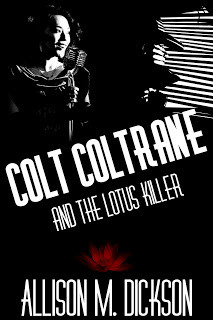 I don't normally post excerpts of my WIPs here on my blog, but I've been hard up for topics of late, and I figure I might as well share a little bit of what's been occupying my time these days, just to keep this place from falling completely into disrepair.
I don't normally post excerpts of my WIPs here on my blog, but I've been hard up for topics of late, and I figure I might as well share a little bit of what's been occupying my time these days, just to keep this place from falling completely into disrepair.A little background. This book is a dieselpunk noir detective thriller, set in Los Angeles during the 1940s. Colt is your classic hard-boiled detective investigating a series of grisly murders taking place in and around the murky L.A. River. But the story has a bit of an Asimovian twist. Colt's partner is a robot. PETE (or Patented Electric Tactical Enforcer) units serve alongside most of the LAPD detectives as part of a pilot program developed by the shadowy Takahashi Industries. They serve mainly as recording devices during an investigation, and they also have some minor data storage and can also do some deductive reasoning. They also have a handy pursuit mode that can make it easier to pursue criminals on foot. Colt's PETE unit is even more special, though. But I won't reveal why here. In the following excerpt, we see Colt interacting with his friend, Mack McIntyre, former small-time bookie and owner of The Parts Bin, an underground night club/casino run mostly by disused and abandoned bots he's salvaged and re-purposed in his workshop.
This is still in first draft form, btw, so expect things like typos and other basic inconsistencies.
Chapter 6
Pete and I were on the way to the Parts Bin after a call from Mack raving like his ass was on fire. He'd been that way ever since he'd gotten that first peek into Pete's innards six weeks ago, and he was making new discoveries in that crazy workshop of his every day. I didn't know what all those things were, but from what I could pick up from Mack's gibberish, I was about to find out.
The last month and a half had been a non-stop bloodbath. We had four definite cases on the books for what the press had dubbed "The Lotus Killer," and one more that was a maybe. That vic, a homeless vet we later identified as Anson P. Raglan, didn't quite fit the M.O. First of all, he was an American male. All the other vics were Asian or Asian-American women. Second, there was no lotus at the scene. But the strange circular markings and the overall mutilation of the body pointed toward the same murderer. We figured maybe the flower had washed away, or that the killer had gotten spooked while dumping the body and forgot to leave it.
And that was another thing. We could find no tracks to or from the scenes, either foot or tire. It was like the vics had fallen from the sky, or were belched up from the sewers below. There had been some minor speculation on that last thing, but no one had done more than a cursory expedition down there. The network of tunnels and drains running beneath the city were as tangled as the hair on the back of a busy whore's head. There had also been a lot of rain over the last few weeks, and no one was willing to risk drowning just yet.
Tracking the source of the flowers was also a dead end. The Orchid Man from the Flower District came forth with all his sales records, but there was nothing indicating regular or large purchases of white lotus blossoms. Same with the District's other vendors. I was sure at this point that the killer was growing them himself.
Mack McIntyre was listed as one of the Orchid Man's clients, but Komiko Takahashi's stage dressing had to come from somewhere, and there was nothing else linking either of them to the murders. Their alibis were rock solid. I would know that, because when Pete and I weren't working the case, we were usually at The Parts Bin, shooting billiards or listening to Komiko sing.
I won't deny it. The dame had me in her snares, like a bug caught in a Venus fly trap. She'd revealed nothing new to me about the nature of her relationship with her father or his machines. Instead, she looked into my soul from the stage, singing in a language I didn't know. But I somehow knew the words, deep down in that place where I think every human being understands each other, no matter how different they are. She was singing about a pain that mirrored my own. It was etched into her perfectly painted face, those parted red lips, those black eyes rendered into slits as she lost herself in the music.
I could only watch her, never touch. Her number still rested in my coat pocket, but I never called it. She was Mack's girl. And even though Ava had officially locked me out of the house two weeks ago, I was still a married man.
I did tail Komiko on a few occasions. For one thing, she fit the victim profile, and I wanted to be sure she was safe. But I also wanted to see where she would go, if her errands took her anywhere near the L.A. River. Turned out, she never ventured more than a few blocks from the Bin, and it was mostly to shop.
The workshop at The Parts Bin was busier than I'd ever seen it. Sparks flew everywhere as about a half dozen guys worked grinders and welders at their stations. Judging by the array of metal arms, legs, heads, and torsos being slung around, it looked like several new bots were under construction. A manly musk of ozone, sweat, and grease filled the air.
I found walked up to one of the workers who didn't look as busy as the others. In fact, he looked downright confused by the mess of wires and gears lying before him. "Where's Mack?" I asked.
He turned around and noticed me and then goggled up at Pete. He didn't have much by way of teeth in his head, so his mouth had a sunken in quality about it. "Uh, I think he's over in the stacks checkin' inventory. Somethin' like gat. Say, that's some bot. I never seen a PETE up close before."
"That's a good thing," I said. "Most folks who do are on their way to jail."
"Dammit, Simpson! Why didn't you tell me Colt was here? I've been waiting for him all morning!" Mack walked up to the table carrying an armload of small boxes and set them down on the workbench.
The guy I'd been talking to, who I guess was named Simpson, nodded furiously and dropped his eyes down. "Yessir. I was just about to come and get ya."
Mack rolled his eyes. "Yeah, sure you were." He turned to me. "Pardon the mess here. Just hired on a few new guys this past week, and they haven't all caught on to the way things work around here."
"How come you're so busy?"
"New contract. Security company in San Diego wants a whole set of my tin soldiers. And I can build 'em cheaper than that Jap uptown." He jerked his head over to Simpson, who was applying a socket wrench to an arm joint without much success. "Dammit, Simpson! What the hell do you think you're doing? That's a hexagonal nut. Use a 12-point socket! I swear I'd brain you with that wrench if you didn't work so cheap."
"Yessir, right on it," Simpson said, not seeming at all perturbed by the way Mack was talking to him. He grabbed the right socket, fitted it onto the wrench, and got back to work.
"So this is what you wanted me to come all the way down here for?" I said. "To see your little robot sweatshop?"
Mack laughed. "Man, I pulled most of these schmucks off the unemployment line. They even get a free meal benefit. I'm doing them a favor. I'm one of the good guys, remember?"
"Sure," I said.
"But that ain't why I had you come down here. Nope, I got something major in the works right now. Top Secret stuff, my man."
"What is it?"
"Can't tell you that just yet."
I was getting impatient with this back and forth. It was early in the day for me to be here, and I was still hungover from the night before. My head felt like an overblown party balloon. "Well why the hell did you bring me down here? I'm on duty, you idiot. If this doesn't pertain to the Lotus case, you're wasting my time."
Mack held out his hands in a defensive gesture. "Now now, Colt. Don't get hasty. Nothin' I do is a waste of time. There's a method to my madness. But I just need to have Simpson here get your measurements."
I glanced at Simpson and back to Mack, who was doing that excited "kid who has to take a leak" dance again. "If you can't tell me what this is about, I can always come down here with a warrant." It was probably the only building in town I could still get a warrant for, given how things were going lately. But my threat was weak. Mack was the only friend I had that wasn't made of metal.
"I love it when you talk dirty, Colt, but you're just gonna have to trust me. I can say that it's for you, and possibly this Lotus case. And it's the most important work I've ever done. In fact, I'm pretty sure it'll change the world, and you're going to be the very first person to experience the finished prototype. Besides, I tried getting your measurements from your old lady, but when I mentioned your name, she screeched into the phone like a diseased jackal."
I stared at him for a minute and then sighed and took off my coat and hat to hand to Pete. "Jesus Christ, okay. Can we just make it quick? I have a murder investigation to get back to."
"Simpson! Grab the tape measure and get this man's inseam, chest, and arm measurements. Also get his head circumference. Definitely don't wanna forget that."
"Yessir. I'll get right on it." Simpson stopped what he was doing and started poking around on his workbench.
After a few seconds of watching this, Mack sighed and rubbed his forehead. "Check the your tool belt, Simpson."
Sure enough, the white spool of hash-marked tape was hanging from the hip. Simpson approached with some hesitation, the tape outstretched in his greasy hands. Having been to a tailor a few times in my life, I knew the drill and lifted my arms. Simpson wrapped the tape around my chest and called out the measurement to Mack, who was standing nearby with a small notepad and pen in hand. "We got a hundred-and-six on the chest."
Mack looked like he was physically in pain now. "Jesus jumped on a flaming pogo stick, Simpson! Inches, not centimeters!"
Simpson flipped the tape around. "Yessir. All right, we got forty-two on the chest."
"Christ, Colt. You're a scrawny bastard," Mack said.
"I keep active."
"Yeah, on gin and cheap cigarettes."
"And your mother's love."
Mack shook his head and grinned. "You're a cold s.o.b. No wonder we're such good friends." Simpson managed to finish the rest of the measuring without incurring the wrath of his boss, and a few minutes later, Pete and I were leaving the Parts Bin and heading back toward the station.
Published on August 15, 2011 11:22



